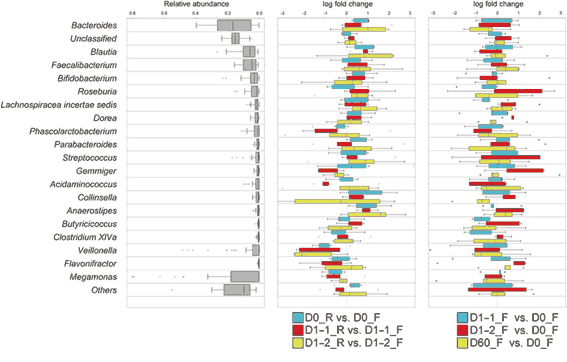Home > Information > press release > New simple storage method for faecal samples offers improvements in the metagenomic analysis and the study of disease
New simple storage method for faecal samples offers improvements in the metagenomic analysis and the study of disease
August 5, 2016
National Cancer Center
Tokyo Institute of Technology
in Japanese
Conventionally faecal samples are frozen on dry ice or in a deep-freezer immediately after collection, because bacterial taxa can undergo changes within 15 minutes at room temperature. However, immediate deep-freezing is often inconvenient in clinical practice, so a simple storage method at room temperature is desirable.
Researchers stored faecal samples in a guanidine thiocyanate solution kept at room temperature and compared them with samples preserved using conventional fresh freezing. Samples stored at room temperature showed no significant difference in taxonomic composition from those stored using conventional methods. This new, simple storage solution offers a means for metagenomic analysis of faecal samples stored at room temperature. The study further showed that bacterial composition did not vary significantly before or after large intestine colonoscopy and pre-washout.

Figure: Fold changes in taxonomic abundance of 20 dominant genera.
Left, fold changes in taxonomic abundance of 20 dominant genera. Middle, comparisons between frozen and room temperature-stored samples from one day before colonoscopy (blue), the test day morning (red) and during bowel cleansing (yellow). Right, comparisons between baseline samples (D0_F) and samples from the test day morning (blue), during bowel cleansing (red), and 2 months after colonoscopy (yellow).References
| Authors | Yuichiro Nishimoto1, Sayaka Mizutani1, Takeshi Nakajima2, Fumie Hosoda3, Hikaru Watanabe1, Yutaka Saito2, Tatsuhiro Shibata3,4, Shinichi Yachida3*, Takuji Yamada1* |
|---|---|
|
Affiliations |
1 School of Life Science and Technology, Tokyo Institute of Technology 2 Endoscopy Division, National Cancer Center Hospital 3 Division of Cancer Genomics, National Cancer Center Research Institute 4 Laboratory of Molecular Medicine, Human Genome Center, The Institute of Medical Science, The University of Tokyo, |
| Journal |
Gut |
| Title | High stability of faecal microbiome composition in guanidine thiocyanate solution at room temperature and robustness during colonoscopy |
| DOI |
10.1136/gutjnl-2016-311937 |
| URL | http://gut.bmj.com/content/early/2016/06/23/gutjnl-2016-311937.full |
*corresponding author e-mail: syachida[at]ncc.go.jp , takuji[at]bio.titech.ac.jp (Please replace [at] to @.)
Press release
New simple storage method for faecal samples offers improvements in the metagenomic analysis and the study of disease (PDF:438KB)Contact
National Cancer CenterE-mail: ncc-admin[at]ncc.go.jp (Please replace [at] to @.)
Tel: +81-3-3542-2511
Center for Public Affairs and Communications
Tokyo Institute of Technology
E-mail: media[at]jim.titech.ac.jp (Please replace [at] to @.)
Tel: +81-3-5734-2975
